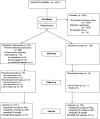Maintaining physical activity among older adults: six-month outcomes of the Keep Active Minnesota randomized controlled trial
- PMID: 17904629
- PMCID: PMC2350214
- DOI: 10.1016/j.ypmed.2007.08.007
Maintaining physical activity among older adults: six-month outcomes of the Keep Active Minnesota randomized controlled trial
Abstract
Objective: We evaluate the 6-month efficacy of Keep Active Minnesota, a phone- and mail-based physical activity maintenance intervention designed for use with adults age 50 to 70 years who have increased their physical activity within the past year.
Method: Participants (N=1049) recruited in 2004 and 2005 from one large managed-care organization in Minnesota were randomly assigned to either treatment (N=523) or usual care (N=526) with physical activity assessed using the Community Healthy Activities Model Program for Seniors questionnaire, and expressed as kcal/week expenditures.
Results: Total physical activity at baseline was similar for treatment and usual care participants (p<0.44) as was moderate/vigorous physical activity (p<0.21). Maintenance of physical activity was higher among treatment participants whose mean 6-month change in total kcal/week energy expenditure was -91, compared to -683 for usual care participants (p<0.002). Mean 6-month change in kcal/week expenditure in moderate or vigorous activities was -49 for treatment participants, compared to -612 for usual care participants (p<0.001).
Conclusions: This phone- and mail-based physical activity maintenance intervention is efficacious at maintaining physical activity at 6 months.
Figures
References
-
- ACKERMANN RT, DEYO RA, LOGERFO JP. Prompting primary providers to increase community exercise referrals for older adults: a randomized trial. J Am Geriatr Soc. 2005;53:283–9. - PubMed
-
- ANDERSON RT, KING A, STEWART AL, CAMACHO F, REJESKI WJ. Physical activity counseling in primary care and patient well-being: Do patients benefit? Ann Behav Med. 2005b;30:146–54. - PubMed
-
- BANDURA A. Social Foundations of Thought and Action: A social cognitive theory; Englewood Cliffs, NJ, Prentice Hall. 1986.
-
- BANDURA A. Health Promotion by Social Cognitive Means. Health Educ Behav. 2004;31:143–164. - PubMed
Publication types
MeSH terms
Grants and funding
LinkOut - more resources
Full Text Sources
Medical
Miscellaneous


